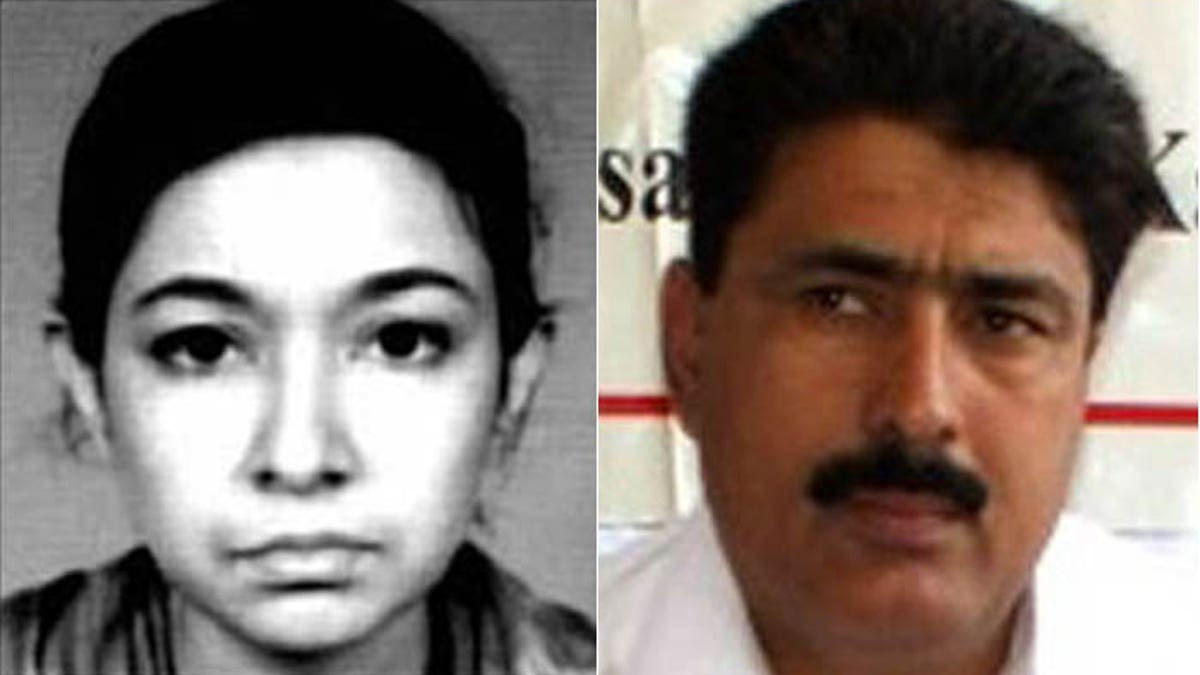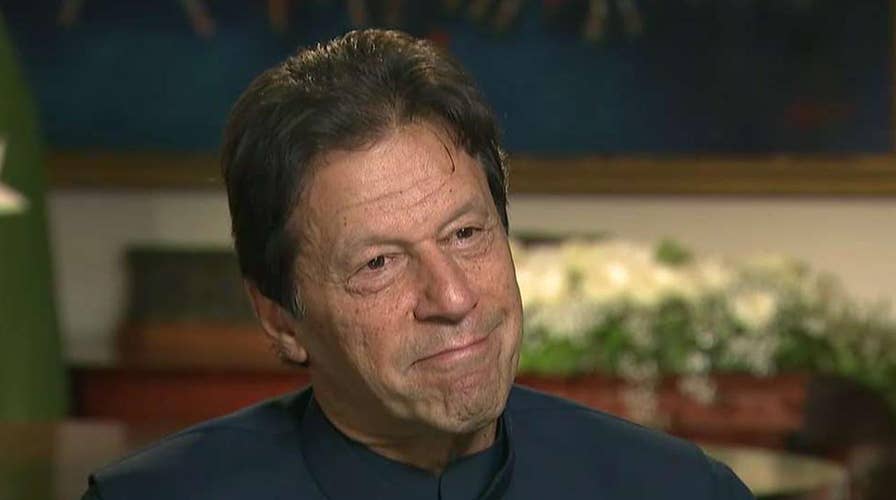Imran Khan on meeting with Trump, Taliban talks, fate of Pakistani doctor who helped track Usama bin Laden
Pakistani Prime Minister Imran Khan joins Bret Baier for a wide-ranging, exclusive interview on 'Special Report.'
For more than eight years, Dr. Shakil Afridi – often deemed a “hero” doctor for his role in the CIA plot to take down Usama bin Laden – has been languishing behind bars in Pakistani prisons, slapped with a 23-year sentence.
But there now appears to be some movement, or at least political willingness on both sides, to see him freed.
PAKISTANI PM SAYS COUNTRY WOULD GIVE UP NUCLEAR WEAPONS IF INDIA DID AS WELL
Following a seemingly successful first meeting between President Trump and Pakistan’s Prime Minister Imran Khan at the White House, Khan suggested late Monday that a prisoner swap for Afridi's freedom could be possible in the future. He acknowledged in an interview with Bret Baier on Fox News’ "Special Report" that the doctor's role was an “emotive issue” in his homeland and one which “embarrassed” Pakistanis.
“Here we were, an ally of the U.S., and the U.S. did not trust us. And they actually came and bombed and killed a man in our territory,” Khan said. “Let’s not forget that Pakistan lost 70,000 people in this fight. We were fighting this war for the U.S., and we lost all these people fighting this war. So there was obviously a lot of anger about the way this whole thing was done. But you know that is all in the past.”
Khan also insisted that it was Pakistan’s intelligence outfit, the ISI, that gave information to the CIA that led to bin Laden’s location near a military school in Abbottabad. When pressed further on the Afridi issue, Khan noted that “there are some decisions in a democracy which even a prime minister finds as difficult, because we do have an opposition. But this is something that can be negotiated.”
He went on to suggest the terms for a possible deal: “Yes, we also have someone in prison in the U.S. It’s a frail woman called Aafia Siddiqui. So yes, we could negotiate some sort of a swap,” Khan said, while denying that such an exchange was brought up in the Trump sit-down. “But in the future, because we know that the United States wants Shakil Afridi, so we can negotiate. No negotiations have started, but you know, with Aafia Siddiqui, we could negotiate.”
Speculation has long swirled that a possible prisoner swap could be in the cards, whereby the U.S. would exchange Afridi for Pakistan’s Aafia Siddiqui – a neuroscientist sentenced in Manhattan federal court in 2010 to 86 years in prison for the attempted murder and assault of U.S. nationals and U.S. officers and employees in Afghanistan.
Afridi, who posed as a hepatitis B vaccination doctor to obtain the DNA swabs from the bin Laden compound, is technically serving out a sentence under a conviction for ties to the outlawed militant group, Lashkar-e-Islam. However, his supporters have cast such accusations as a fabricated excuse for punishment.
Following their closed White House meeting on Monday morning, Trump – who many anticipated would at least raise the Afridi issue with his Pakistani counterpart – told reporters that he soon would have “good news about hostages,” but no names or further details were provided.

Al Qaeda operative Aafia Siddiqui, (l.), for Dr. Shakil Afridi (AP)
Yet the possibility that the issue reached such high-level discussions has given some hope to Afridi’s family and his lawyer and cousin, Qamar Nadeem.
“For me and his family, it is a moment to celebrate with a zeal that finally the Trump administration has fulfilled its promise to bring this lingering issue to the table,” he told Fox News on Tuesday morning.
And for Nadeem, the Siddiqui trade is increasingly appearing like the only way forward.
“There is no way left to bridge the trust deficit between Islamabad and Washington except reinitiating this high-level prisoner swap. This lady has been dear to Pakistani people,” he said. “Freeing Dr. Afridi will benefit Pakistan, help to regain its lost trust with the United States and [the swap] will help Prime Minister Khan secure the next election by securing more Pashtun votes.”
Afridi, who is now about 57 years old, is currently being held in a high-security prison in Sahiwal, Punjab Province, after being moved from a more guarded facility after rumors ran rampant that the U.S. was preparing to bust him out – though no official reason was provided to his lawyer.
Concerns over his dwindling health condition have once again been reignited.
“At present, his health condition has gone from bad to worse as he continues to lose pounds between each family visit. Their primary concern was of the poor sanitary conditions in prison and non-availability of air conditioners or a fan, that has made his life miserable as hell,” Nadeem said. “Life is non-existent in his prison cell and no measures have been taken to beat the scorching heat that has caused a bad rash over his body, and he is yet to receive medical treatment.”
The attorney also asserted that his immediate family – only his wife, children and his brother Jamil are permitted by the jail superintendent to visit him once a month – have bemoaned what they believe to be violating “body checks” prior to enter the facility.
PAKISTANI 'HERO' DOCTOR AFRIDI 'SKELETAL,' DEPRIVED OF LEGAL RIGHTS, ATTORNEY CLAIMS
Moreover, grave safety concerns still surround his impoverished family, who are struggling to survive financially amid Afridi’s imprisonment. His wife and children are forced to change locations every few months and lead entirely underground lives, Nadeem said.

President Donald Trump greets Pakistan's Prime Minister Imran Khan as he arrives at the White House, Monday, July 22, 2019, in Washington. (AP Photo/Jacquelyn Martin)
He also expressed frustration that despite being Afridi’s legal representative, he been repeatedly denied visitation.
“It is unfortunate that Afridi has been consistently denied [legal] access to consult with me on his case. Despite my legal win in court which was supposed to allow me to meet him, the jail authorities have turned this ruling on deaf ears,” Nadeem said, urging Khan to address this gap in the justice system.
The next appeal hearing is expected to take place on Sept. 24, and the lawyer is confident that so long as “Trump is trying hard to get him released,” the case will be brought to an end in Afridi’s favor.
Afridi was originally apprehended just weeks after the 2011 raid on the Abbottabad compound where bin Laden was killed.
Pentagon sources close to the operation later told Fox News that efforts and offers had been put in place for Afridi and his immediate family to leave the country. The doctor, however, is said to have declined based on the notion he would not be able to take his extended family. Moreover, Afridi – who was not aware of the target or the exact nature of the mission when he accepted the paycheck – did not expect that the points of the carefully crafted CIA scheme would be exposed by Obama administration officials unveiling details about the scheme, blowing his cover.













































